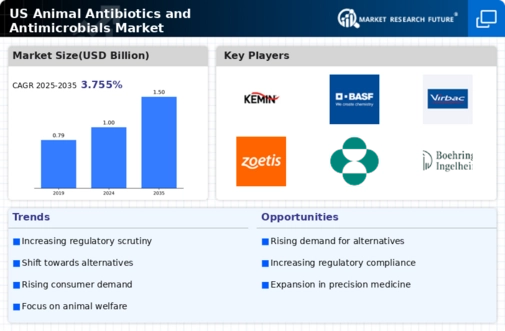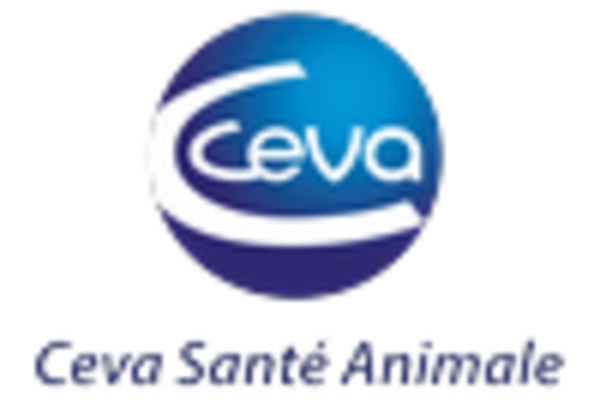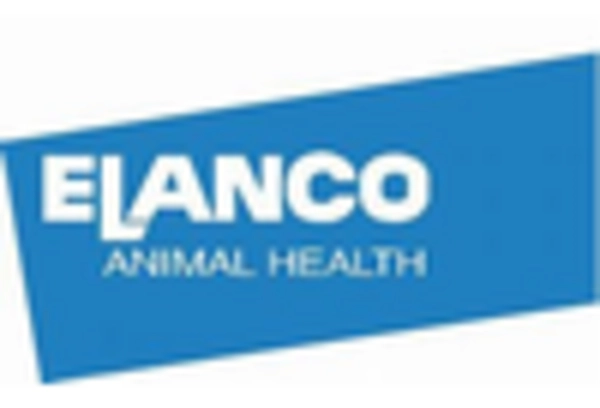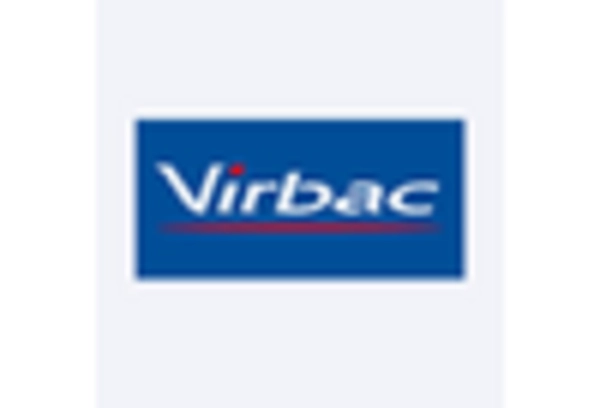Rising Livestock Production
The increasing demand for animal protein in the US is driving the growth of the animal antibiotics-and-antimicrobials market. As livestock production rises to meet consumer needs, the use of antibiotics and antimicrobials becomes essential for maintaining animal health and productivity. According to the USDA, the total meat production in the US is projected to reach approximately 100 million metric tons by 2025. This surge in production necessitates effective disease management strategies, including the use of antibiotics, to prevent outbreaks that could jeopardize livestock health and food supply. Consequently, the animal antibiotics-and-antimicrobials market is likely to expand as producers seek to ensure animal health and product quality..
Increased Focus on Animal Health
The growing awareness of animal welfare and health is influencing the animal antibiotics-and-antimicrobials market. Farmers and producers are increasingly recognizing the importance of maintaining optimal health in livestock to enhance productivity and reduce losses. This trend is supported by various studies indicating that healthy animals lead to better growth rates and lower mortality. The American Veterinary Medical Association emphasizes that proper use of antibiotics is crucial for preventing disease and ensuring animal welfare. As a result, the demand for effective antibiotics and antimicrobials is expected to rise, reflecting a commitment to animal health and the overall sustainability of livestock production.
Regulatory Support for Responsible Use
Regulatory frameworks in the US are increasingly promoting the responsible use of antibiotics in livestock. The FDA has implemented guidelines aimed at reducing the use of medically important antibiotics in food-producing animals. These regulations encourage producers to adopt best practices in antibiotic use, which may lead to a more sustainable approach to animal health. These initiatives are likely to benefit the animal antibiotics-and-antimicrobials market by fostering a culture of responsibility among producers.. Compliance with these regulations not only enhances animal welfare but also addresses public health concerns regarding antibiotic resistance.
Growing Demand for Meat and Dairy Products
The rising consumption of meat and dairy products in the US is a key driver for the animal antibiotics-and-antimicrobials market. As consumer preferences shift towards protein-rich diets, the demand for high-quality animal products increases. According to the USDA, per capita meat consumption is expected to rise, leading to greater pressure on livestock producers to maintain animal health and productivity. This trend necessitates the use of antibiotics and antimicrobials to prevent disease and ensure the quality of meat and dairy products. Consequently, the animal antibiotics-and-antimicrobials market is poised for growth as producers seek to meet the escalating demand.
Technological Advancements in Veterinary Medicine
Innovations in veterinary medicine are significantly impacting the animal antibiotics-and-antimicrobials market. The development of new formulations and delivery methods for antibiotics enhances their effectiveness and reduces the risk of resistance. For instance, advancements in pharmacogenomics allow for tailored antibiotic therapies that improve treatment outcomes. The American Animal Hospital Association reports that the integration of technology in veterinary practices is leading to more precise and effective use of antimicrobials. This trend not only supports animal health but also aligns with regulatory efforts to minimize antibiotic resistance, thereby fostering growth in the animal antibiotics-and-antimicrobials market.
.png)
















